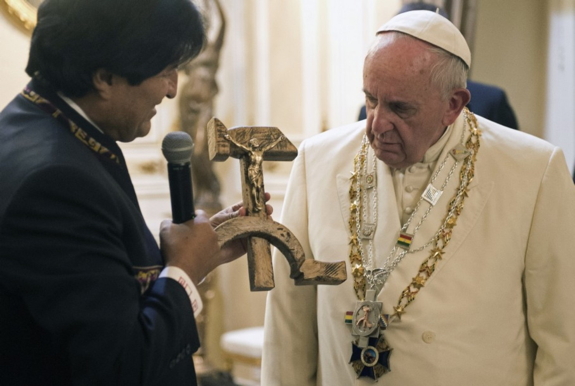
(above) Bolivian President Evo Morales presents Pope Francis with a crucifix carved into a wooden hammer and sickle, the Communist symbol uniting labor and peasants, in La Paz, Bolivia, on Wednesday, July 8, 2015. (L'Osservatore Romano/Pool Photo via AP)
Leftists are wobbling in South America. Here's why Bolivia's Evo Morales may be the last socialist standing.
January 7, 2016 - The Washington Post
By Nick Miroff
Voters in Bolivia next month will consider a constitutional change that would allow President Evo Morales to run for a fourth term in 2019 when his current one expires.
The referendum comes at a time when voters across South America have been turning against the leftist incumbents who came to power in South America during the so-called "pink tide" of the past decade or so.
Lower prices for oil, minerals and other commodity exports have sapped their ability to finance popular social welfare programs, putting voters in a mood for change.
Only Bolivia's Morales is a little different from the other socialists who have been getting swept out by the tide.
In November, conservative Mauricio Macri was elected president of Argentina, ending 12 years of leftist rule. Venezuela's opposition has won control of parliament for the first time in 17 years. Brazilian President Dilma Rousseff is fighting off impeachment as her country's economy tanks.
Could a symbolic setback for Morales be next?
Elected to a third term in 2014 by a landslide, he still enjoys an approval rating in the mid-60s, according to the most recent polls. Opponents' charges of corruption and an authoritarian style haven't really hurt him. Nor did this video last summer showing the moment when Morales orders one of his aides to bend down and tie the president's shoes.
Morales, the country's first indigenous president, may be the most politically savvy socialist in all of South America.
Morales's leftist bona fides are not in doubt. He loves to skewer "the Empire" (ahem, the United States) and expelled the U.S. ambassador and officials from the Drug Enforcement Administration in 2008. And he is, after all, the guy who gave Pope Francis a crucifix shaped like a hammer-and-sickle.
But one thing is politics. Another is policy, and that's where Morales has proven to be quite adept.
Case in point: Morales this week is championing a series of new laws to promote Bolivia's tiny wine industry. He has ordered government ministers to work with the country's vintners to reduce taxes and boost exports. Morales said he will personally promote Bolivian wine in his travels abroad.
Most people tend to think of high-altitude alpacas and quinoa when they imagine Bolivian products. But a small number of families have been producing wine for generations in the country's lower-elevation Tarija department, which has a warm, arid climate well-suited for vineyards. The country also produces a type of brandy called singani whose export Morales also wants to promote.
While this type of local boosterism is the regular stuff of retail politics in most countries, other South American socialists don't tend to team up with private business. In Venezuela, most notably, the inclination of the late Hugo Chavez -- and now his embattled successor, Nicolás Maduro -- has been to blame them for economic sabotage and seize their assets.
But Morales has come a long way from the early days of his first term, when the country's more-prosperous lowland regions threatened to secede from Bolivia in revolt. A decade later, after years of sustained economic growth and disciplined fiscal policy, Morales has even won broad support in the Santa Cruz department that is the country's business capital.
Morales, over the past decade, has plowed revenues from booming exports of soy, natural gas and minerals into popular social programs and infrastructure projects, like the hugely popular Teleferico system of aerial cable cars in La Paz.
But he also diligently built up Bolivia's reserves of foreign exchange to a degree that will now help cushion the blow of falling commodity prices. The country's ratio of foreign reserves to Gross Domestic Product (GDP), a key indicator of fiscal prudence, is among the highest in Latin America.
The Feb. 21 referendum gives Morales another chance to win at the polls with more serious belt-tightening potentially ahead. And it would only give him another chance at reelection if he decides to run again, he acknowledges. "If the people want me to stay, they'll say so with their votes," he said.